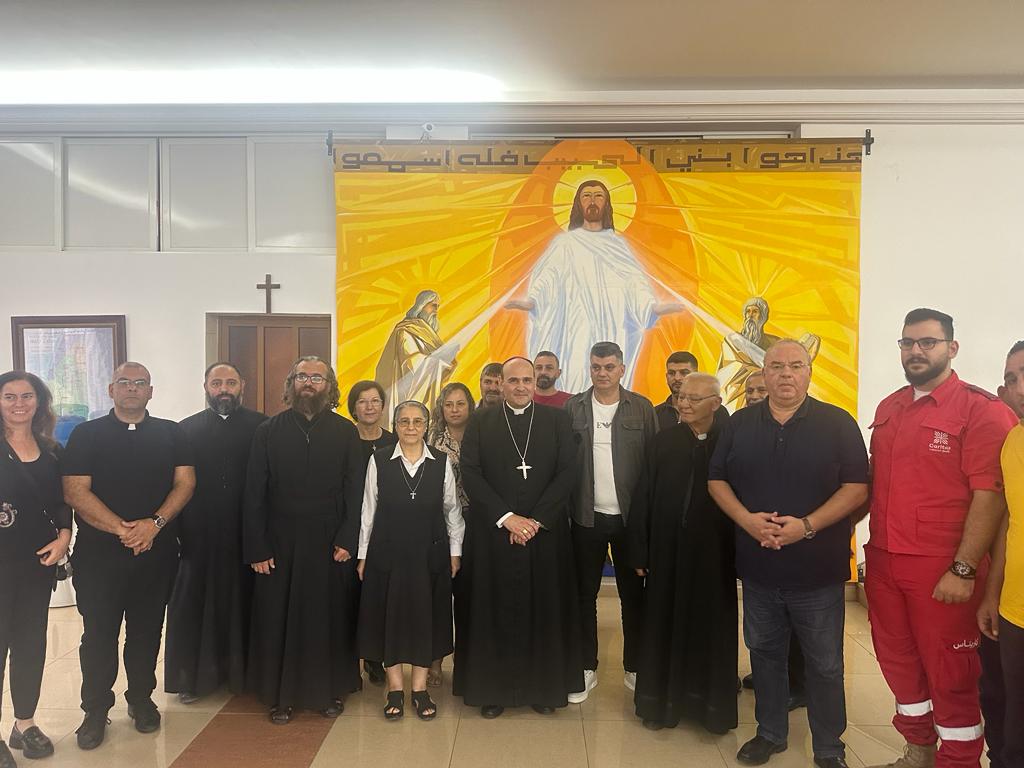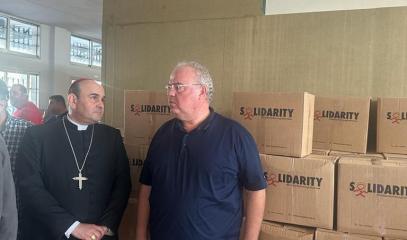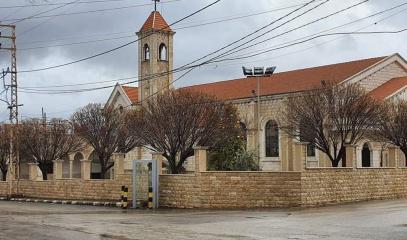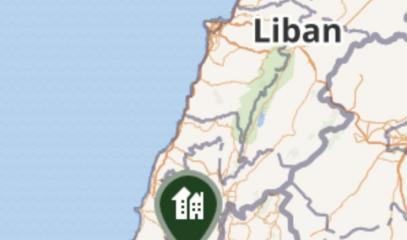Gaza: Lebanon hostage to Hezbollah. Southern Christians fear 'large-scale war'
The villages of Rmeich, Aïn Ebel and Debel received a surprise visit from the apostolic nuncio Msgr Paolo Borgia. This is a war zone, exposed to the exchange of blows between the pro-Iranian movement and the Jewish State. Farmers abandoned part of the fields hit by (banned) Israeli phosphorous shells. The NGO Solidarity provided 1,350 food parcels.
Beirut (AsiaNews) - Cut off from the world, surrounded by the outbreak of war in Gaza by the firepower of the Israeli army intent on repelling the infiltrations of Hezbollah and the Palestinian commandos of the al-Qassam brigades, part of Hamas: these are the conditions of the inhabitants remaining in the town of Rmeich (around 10 thousand people) and in the two nearby villages of Aïn Ebel and Debl, located on the edge of the Lebanese-Israeli border. For this reason, the visit in recent days of the apostolic nuncio Msgr. Paolo Borgia came as a great surprise.
The Vatican diplomat arrived in Rmeich with a convoy of the Lebanese NGO Solidarity, chaired by businessman Charles Hajje, who is also president of the Maronites in the World Foundation, an institution of the Maronite Patriarchate. Welcomed in the town hall, the nuncio conveyed to his guests the blessing and concern of Pope Francis and the Secretary of State, Card. Pietro Parolin, who exceptionally authorized him to visit this war zone.
The town is in fact located in a war zone. “As far as we are concerned, the conflict that Prime Minister Nagib Mikati is trying to avoid by visiting Arab capitals is actually already there and present,” says Milad Alam, president of the Rmeich municipality. The official then thanked the nuncio for his visit. Of course, it is a contained war, but "it has already claimed many victims, including a photographer from the Reuters agency", he recalls.
However, although limited, this war, which the vast majority of Lebanese do not want, is starting to take its toll on the border population. Faced with Hezbollah, the Lebanese state has revealed the extent of its impotence. Municipalities are deprived of their resources and the population feels forgotten by the central government. The Lebanese army has no say in the south of the country of cedars and the United Nations Interim Force in Lebanon (Unifil) is reduced to appealing to reason towards all parties involved.
Receiving the nuncio, the president of the municipality of Rmeich was direct. “What does Gaza have to do with us?” he asked. He gave voice to a widely held opinion in Lebanon, where the silent majority and representative parties, particularly of the Christian communities, believe that "Lebanon is being held hostage by Hezbollah".
Gift of the nunciature
Expressing the pope's concern for their safety and his repeated calls for a ceasefire in Gaza, the nuncio presented the residents of Rmeich with a monetary donation. For his part, the NGO Solidarity delivered to the population a batch of 1,350 food parcels, the ingredients of which were specially selected to require minimal cooking. “We have also increased the portions, because who knows when we will be able to return here,” explains the load manager.
Like him, residents limit their movements to avoid indiscriminate attacks by the Israeli army's artillery and drones. Yesterday, the military of the Jewish State targeted a car on the road to Aïnata, killing four people, three children and their grandmother, and wounding a fifth, the mother. In the morning, four rescuers from the Al-Rissala scouts, part of the Shiite Amal movement, were injured in a drone attack. Hezbollah, for its part, also announced yesterday the death of two of its fighters, bringing the number of victims since October 8 to 60, and promised to respond to the bombing of civilians.
Last November 3, in his first speech since the beginning of the conflict, the leader of the pro-Iranian movement Hassan Nasrallah attributed "full responsibility" for the war between Israel and Hamas to the United States. He also warned Israel of the "stupidity" that an attack on Lebanon would or would represent, adding that stopping "the aggression against Gaza" would prevent the conflict from escalating regionally. Finally, the Hezbollah leader specified that neither Iran nor his movement were aware of the preparations for the October 7 attack.
“To ensure that olives can be harvested from fields exposed to fire, the inhabitants of Rmeich and the surrounding area must warn Unifil, which has other things to worry about” underlines Charles Hajje. He adds that after some olive groves were bombed with phosphorus shells, which are reportedly banned, residents refrained from harvesting anything in certain areas and in some fields, fearing the harmful effects of phosphorus on olive oil.
Keeping the schools open
The main concern of the inhabitants of Rmeich today is to keep the town's two schools open. "If we close, the entire village will quickly be abandoned," Sister Rita Eid, headmistress of the Maronite school of the Holy Family, which normally provides education for 700 young people, tells AsiaNews. Today, two-thirds of the families have taken refuge with relatives in Beirut. Only those who have nowhere else to go or who fear looting remain. Two priests and three monks have also remained in Rmeich. Masses are still being celebrated, but the school is closed as a precaution. The distant echoes of the explosions have reached the nuncio's ears. They are now part of the landscape.
Rmeich, Aïn Ebel and Debl live by the day, hoping against hope that war, the great war, will not break out. For her part, thanks to private funding, Sister Rita has set up online courses and started distance learning to prevent her pupils, left behind or missing out, from missing the year. This is also one of the many faces of resistance.
07/10/2023 14:29
10/10/2023 13:40
17/05/2021 10:29










.png)










